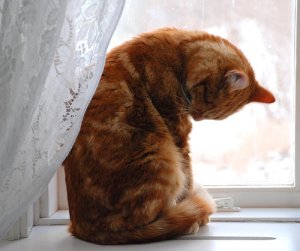How to Prevent Nasty Hairballs!
January 31, 2010 by LaBecs
Filed under How to Prevent Nasty Hairballs!
Watch any cat for a few minutes, and if he or she’s awake, you’ll see them grooming themselves with the help of their rough pink tongue. While this is a natural part of cat behavior, it is also the main cause of hairballs.
A hairball is just what it sounds like: a ball of hair. The technical term is trichobezoar. If you get hair in your mouth, you can just spit it out. But you cat can’t do that. Instead, she has to swallow the hair that comes off on her tongue during grooming. The bad news is hair can’t be digested.
Normally that’s not a problem either. The hair can still pass through the digestive tract and come out as part of the waste. However, sometimes the hair builds up in the stomach and can’t pass through the cat’s intestines. When that happens, the only way your cat can get rid of the nasty ball of hair is by throwing up!
Although seeing a cat vomit can be a disgusting and nauseating process to witness (the sounds alone make some pet owners gag), it’s better than the alternative. When your cat can’t throw up the hairball, they could end up with an obstruction that could be life-threatening and require surgery. Most feline owners would rather clean up a disgusting hairball then watch their beloved pets go under the knife.
But, thankfully, we have more options. We can actually prevent the formation of hairballs and reduce the risk of complications. Here are three tips that can help you help your cat.
Method #1: Reduce Excessive Hair
 When your cat is shedding a lot or needs a good brushing, he or she is more likely to develop hairballs that will need to be coughed up. You can help by spending time each day brushing your cat. Some cats love being brushed and will actually beg you to do it. Others aren’t crazy about being restrained and brushed so they are more resistant. But you can teach your cat to like getting groomed. Over time, even the most reluctant cat usually learns to love being brushed. Besides helping get rid of too much hair, regularly brushing reduces the amount of shedding your cat does (that’s good news for your furniture and clothes) and provides you with a great opportunity for bonding.
When your cat is shedding a lot or needs a good brushing, he or she is more likely to develop hairballs that will need to be coughed up. You can help by spending time each day brushing your cat. Some cats love being brushed and will actually beg you to do it. Others aren’t crazy about being restrained and brushed so they are more resistant. But you can teach your cat to like getting groomed. Over time, even the most reluctant cat usually learns to love being brushed. Besides helping get rid of too much hair, regularly brushing reduces the amount of shedding your cat does (that’s good news for your furniture and clothes) and provides you with a great opportunity for bonding.
Method #2: Give Special Treats as treatment
If you look at the treat section of your pet store, you’ll probably find some specially formulated treats designed to help break down hairballs in your cat’s stomach. Most of these treats come in delicious flavors – at least as far as your cat is concerned – so they eat them well. This might be a good idea if you notice your cat coughing up a lot of hairballs, or even just coughing without throwing anything up.
Method #3: Pass the Hairball
Sometimes a stubborn hairball can use a little help. Most pet stores also carry petroleum-based products that can be used to lubricate the cat’s hairball and intestines to make its passage easier. These products are 100% safe and come in cat-friendly flavors. Sometimes they can be added to the cat’s food.
A combination of all these methods can help control your cat’s hairball problem and can prevent life-threatening complications. And for you, the advantage is that you’ll spend more time grooming your cat, and less time cleaning up.
Why Does a Cat Stop Using the Litter Box?
June 29, 2009 by LaBecs
Filed under Why Does a Cat Stop Using the Litter Box?
While cleaning out the litter box is not a wonderful chore that anyone enjoys, it is a necessity for your cat. This is, after all, your cat’s bathroom area and cats have a tendency to be very fastidious. If your cat suddenly starts having litter box problems and using the bathroom elsewhere, this might be a sign that you need to be cleaning that box more often. However, it can also be a sign of other problems, including serious medical conditions.
Reason #1: Busy Location
Cats are private animals. While a dog will do its business outside with everyone in the world watching and think nothing of it, cats have to relax in order to get the job done. If the litter box is located in an area where people are always coming and going, that’s going to be upsetting to your cat and he or she is likely to go elsewhere in the house, usually some place quiet like a corner.
Now, if you haven’t moved the litter box and if the traffic in the area hasn’t increased lately, but your cat has suddenly stopped using it, there’s probably another good reason.
Reason #2: Cat Preferences
Cats seem to be a lot pickier than dogs about everything from toys to food to sleeping locations. They are also sometimes very picky about their litter boxes. Many cats like certain types of litter better than others, possibly because of the way it feels on their paws. Other cats have litter box type preferences. While some love to have the covered boxes for more privacy, others prefer something that is a little more open so they can what is going on around them.
As with the first reason, if you haven’t made any changes that might upset your cat’s preference but he or she has suddenly stopped using the litter box, there is probably a different reason as the root cause.
Reason #3: Medical Problems
In some cases, a urinary infection or some other health problem can cause cats to have litter box problems. They may have a hard time going to the bathroom or may associate the litter box itself with discomfort which makes the box undesirable. If the sanitary reasons and the first two reasons don’t seem to explain the sudden change in your cat’s behavior, you should seek advice from a veterinarian immediately. Your cat might have a very serious health problem.
If you cat is defecating outside the litter box, he or she may have worms, gas, or other intestinal distress so a vet visit is definitely recommended. Remember that once your cat starts using the bathroom outside of the litter box, cleaning it with a solution that will destroy the enzymes in the urine or feces is essential. Otherwise your cat is going to continue to view that spot as an appropriate choice for going to the bathroom.

Amanda
Reason #4: Behavioral Problems
If you’ve ruled out all of the other reasons, you’ll have to start thinking like your cat and trying to pinpoint what may be the real problem. Anxiety can be one reason. A cat that doesn’t like to be left alone may use the bathroom outside the litter box as a sign of separation anxiety. A cat that’s angry because a new family member or pet has come into the picture may also start protesting by not using the litter box correctly.
When emotional issues are involved, you may find it harder to pinpoint the cause. However, you may be able to work with your vet on figuring out the best way to solve the problem so your cat can start using the litter box again and you can cut down on cleaning the carpet and other areas of your home.
Unfortunately, it’s very hard to fix a behavioral problem if you don’t know the exact cause. However, with patience and love, you might be able to find the cause and fix the problem. Sometimes medication can help. Do your research before taking any drastic measures. Always remember that no matter what he or she does, it’s not done to spite you. Cats are not capable of those ‘humanoid’ feelings. If your cat is having litter box problems, he doesn’t deserve to be punished or God forbid, euthanized, just because we don’t understand his reasons.
Are You Really Ready to Adopt a Pet?
March 24, 2009 by LaBecs
Filed under Are You Really Ready to Adopt a Pet?
It always happens. Every time you see the picture of a cute little pup or furry little kitten, you ‘awww’ and ‘oooh’ and you just want one! You can’t help but pet each dog that comes your way while walking on the street and you bring tasty treats for your friend’s pets when you go visiting.
Every time a pup licks you or a cat rubs against your leg, you think it’s a sign telling you to get your own. But hold your horses! (or doggies, or kitties, as you might prefer). Adopting a pet is about a lot more than signs or gut feelings or even desires.
We’re not discounting desire as a factor in bringing home a pet – it is important – but there are other factors that are much more important. Many owners have fallen prey to the misconception that the ‘I-just-saw-him-and-fell-head-over-heels-in-love’ feeling will see them through the 15 odd years they will spend with their pets. Adopting a pet is quite a happy thought. However, it needs to be turned into reality. You need to give owning a pet a lot of thought.
The following points make it easier for you to judge if your decision is really sound, read it through and answer each point honestly to reach a conclusion.
What’s your reason for adopting?
Adopt for a reason that will last, since that will determine how healthy and enjoyable your relationship will be. Reasons like momentary loneliness, boredom, or curiosity might not be ideal, since these conditions will pass. You need a reason that will keep for many, many years to come.
Do you have time?
Having a pet in your house requires a good investment of time, and it can’t be put on a schedule of maybe one hour a day. When your pup is young, you will have to spend a lot of time with him, training him and getting him used to your home. When he falls sick, you’ll have to be by his side. And, you should give them this time gladly, not just out of obligation.
 Can you afford it?
Can you afford it?
Adopting doesn’t just involve the cost of adoption fees. Taking care of a pet comes along with a series of expenses – good food, grooming, hygiene, toys, changes to your house, regular vet visits, medication, and what not.
What is you lifestyle?
Do you live in a place where you can share space comfortably with a pet? If you live in a condo you might feel cramped and your neighbors or landlord might object. Also, if you work late nights, have a baby, travel a lot or have an erratic schedule, a pet might not fit well into your scheme of things.
What happens if something goes wrong?
 What if you get sick or you have to leave the pet alone? Do you have someone you can count on to help you out? Becoming solely responsible for another life is a big decision. You will need some kind of help (friends, relatives, friendly neighbors) or at least the financial means to hire such help.
What if you get sick or you have to leave the pet alone? Do you have someone you can count on to help you out? Becoming solely responsible for another life is a big decision. You will need some kind of help (friends, relatives, friendly neighbors) or at least the financial means to hire such help.
Will you commit?
The most important question: Do you think you can love, cherish and take care of your pet for as long as he lives? I repeat – as long as he lives. This is quite a responsibility. If you’re going to adopt a pet, you will need to promise yourself that you will take care of him to the best of your ability. And taking care of a pet is quite a task.
If most of these questions make you reconsider your decision, don’t lose heart. It’s all for the best. Visit any animal shelter and you will notice that most of the animals are there because their owners didn’t think of all these questions, got carried away by their feelings and took the animal home, only to realize a year later that they couldn’t handle it. It is a highly insensitive act – to willingly welcome someone into your home and then turn them out – especially someone as helpless and innocent as a poor little dog or cat.
All these factors are just as important if not more as what ‘kind’ of a pet you want to have. For instance, dogs require exercise, some, at least an hour every day. If you live in an apartment in the city and you don’t like to walk, this becomes unfeasible. Even a tiny and active little terrier is more suited with owners who have the time to give it exercise and play with it. But don’t think a cat is any easier… well it is, since you don’t have to walk them, but they do need play time, and attention, and although they have this reputation of being independent, they crave company and they need it to be healthy and happy.
Welcoming a pet into your house and your life can be one of the most enriching experiences you ever have. However, thinking it through is very important. When you bring a pet home, it’s just as having a baby – every decision you make thereon affects you and your pet in equal measure. It’s a living being who you will share a good part of your life with… but oh, what a fulfilling life it will be.
Mistakes New Cat Owners Shouldn’t Make
March 13, 2009 by LaBecs
Filed under Mistakes New Cat Owners Shouldn't Make
Getting a cat is a big step and there are some mistakes one should avoid. Cats have a reputation for taking care of themselves, but that doesn’t mean they don’t need any care. Before deciding to adopt that beautiful kitten, take the time to do some homework, thus avoiding these common mistakes made by new cat owners. That way you will have a happier and healthier cat and a long-term companionship with another living being, the like of which you never dreamed.
Adopting in a Rush
If you feel the impulse to buy a new shirt, or a new pair of shoes, you can always return it if it doesn’t fit right or if it’s the wrong color. But adopting a living creature like a cat or kitten, that will become a family member, is a different matter.
Adopting a new cat should be for keeps, so consider carefully before you make that decision.
You need to know that it’s going to cost money to support it. You have to get toys, food, litter boxes, veterinary visits, etc. You owe it to your new cat to take care of his basic needs, as well as being prepared for emergencies.
Not Spay or Neuter a New Cat
People who failed to spay or neuter their cats always complain of male cats spraying every available surface of the house or escaping outdoors to fight other male cats; female cats who keep the whole family awake with their loud yowling during estrus; and worse yet, “surprise” litters of unwanted kittens. Society faces an overwhelming cat population problem and that is reason enough to spay and neuter. Spaying or neutering your cat will also have many health advantages, so you have no reason not to do it.
Not Giving Needed Veterinary Treatment
Cats may quickly recover from minor illnesses, but they can also die if an emergency isn’t recognized. Cats need vaccinations, annual examinations, and they definitely need and deserve immediate veterinary care when they become sick or injured.
First Thing to do is choosing a good veterinarian.
Wrong Cat Food Choices

Anastasia
You might save some money by buying cheap cat food, but then you’ll have to spend much more on veterinary care. Cats are carnivores and need a good source of meat protein. They do not need large amounts of grain fillers, especially corn, which is a cheap source of protein used by many cat food manufacturers. Learn how to choose cat food and select the best brands you can afford. Your cat might eat less of the high quality food because they don’t have to gorge to get the nutrients they need.
Declawing Without All the Facts
Many innocent new cat owners have been convinced to declaw when a veterinarian asks: “Do you want your kitten declawed when we spay her?” Some veterinarians consider declawing a “routine” surgery, but cat advocates consider it cruel, inhumane, and unnecessary in almost every case and I totally agree. Learn the facts so that you can make an informed decision.
Allowing a Cat to Roam Free Outdoors
Many people believe cats are happier being free, breathing fresh air, and basking in the sunshine of an outdoor life, while many others can assure you that cats can be very happy and healthy living totally indoors. The outdoors offers dangers not found inside and that cannot be denied. Fortunately, there are many compromises that will give you and your cat the best of both worlds, while keeping him or her safe and happy.
Poor Litter Box Maintenance
Cats will always use their litter box, as long as it’s kept very clean, and the litter is not scented or unpleasant to the cats’ feet. Carefully maintaining your cat’s litter box will almost always guarantee you that you will not be faced with litter box avoidance problems.
However, if your cat suddenly starts urinating outside the box despite your careful maintenance, you should immediately have it checked for a urinary tract problem with your veterinarian.
A Cat is Not Property
When you join the ranks of cat lovers, you’ll find that we refer to our cats as family members, rather than “pets.” While cats may legally be considered “property” in some jurisdictions, the term ends there. If you haven’t figured out the distinction by now, your new cat will let you know in no uncertain terms. In fact, many cat lovers describe themselves as being owned by their cats!
Ignoring them
We always hear that cats are independent and should just be left alone. You will soon find out that they are very loving creatures that long for their human’s company. They will follow you around like a puppy, and will want to play with you. Play with them to keep them sharp and interested. The more toys they have the better, and you don’t have to spend a fortune. You’ll find how to make cheap toys in later articles.
Not Allowing a Cat to Be a Cat
Cats’ unique ways make them the endearing creatures they are. Some of their traits, however, may cause frustration because we don’t understand their needs. Cats instinctively seek out high places and sharpen their claws because they are cats, not because they are stubborn and disobedient. Our job is to accommodate those needs in acceptable ways.
Forcing your Love on them
They are sooo cute!!!! You just want to eat them up, hug them and squeeze them. But this is the fastest way to annoy them and make it harder to bond with them in the long run. Although many cats are all for it, many others are not quite as eager to be hugged. Take your cues from them, they will let you know what they like, never doubt that.

